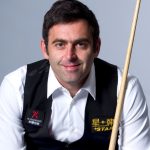Ronnie O’Sullivan: Seven-Time World Champion, Record-Breaking 41 Ranking Titles, 23 Triple Crown Victories, 1000+ Career Centuries, and the Greatest Fast-Attacking Snooker Genius in History, Tying Hendry’s Modern-Era World Championship Record
The snooker world has produced champions, icons, and legends—but few names resonate with the same electricity as Ronnie O’Sullivan. Known as The Rocket, his story is more than just about trophies and centuries. It is about a man who defied the constraints of the sport, who merged artistry with ruthless efficiency, and who continually reinvented himself when others thought he was finished.
In smoky clubs across England during the early 1990s, whispers began about a teenage prodigy from Essex. “He’s different,” people said. “Faster than anyone you’ve seen, fearless, and with a cue action like poetry in motion.” Those whispers became roars the moment Ronnie stepped onto professional stages. His rapid style of play, almost instinctive, separated him from the methodical pace of traditional snooker. Where others spent minutes plotting, O’Sullivan calculated in seconds. He was a storm in human form—hence the nickname.
But greatness in snooker is not measured merely by speed. It is measured by consistency, mental toughness, and the ability to rise when the lights burn brightest. Ronnie answered every test across three decades of dominance. His seven World Championship titles, won across an astonishing span of 2001 to 2022, tie him with Stephen Hendry for the modern-era record. Yet while Hendry’s dominance was concentrated in the 1990s, O’Sullivan’s career has stretched endlessly, proving not only that he could reach the top—but that he could stay there longer than anyone dared dream.
The Triple Crown events—the World Championship, the Masters, and the UK Championship—are where snooker’s greatest legacies are forged. Ronnie has lifted these prestigious titles 23 times, more than any player in history. Eight Masters crowns. Eight UK Championships. And seven glittering World titles. In each, he brought something memorable. A record-breaking clearance, a lightning-fast 147, or simply the swagger of a man who played the game as though he invented it.
Statistically, his dominance is staggering. 41 ranking titles—the most of any player in history. Over 1000 career centuries, a record that redefined what was thought possible. For perspective, players once celebrated reaching 200 or 300 centuries in a career. Ronnie shattered that ceiling, turning century-making into an art form he produced almost at will. The crowd no longer just hoped for a ton when he lined up; they expected it. And when he delivered, there was an audible mix of awe and inevitability.
Yet, beyond the records, it is the style of O’Sullivan that captures imaginations. His fast, attacking play feels more like a jazz improvisation than a structured performance. He switches effortlessly between left and right hand, not as a party trick, but as a genuine tactical weapon. Where others panic under pressure, Ronnie thrives, often producing his best work when everything is on the line. He is as much entertainer as competitor, knowing that fans come not only to see victory but to be dazzled by genius.
Fictional tales often blur with reality when it comes to Ronnie. Imagine him walking into the Crucible Theatre for a World Championship final. The air is thick, the crowd hushed, cameras flashing. His opponent dares to think they have a chance. Yet within a few frames, Ronnie is in full flow—balls disappearing with machine-like precision, the cue ball gliding across the table like it has a mind of its own. At one moment, he pauses, looks up, flashes a wry smile at the audience, then bends down and completes a 147 break as if it were a casual knockabout in his local club.
Such nights have made him immortal in the hearts of fans. The Saudi Arabia Masters, the Wuhan Open, the UK Championship, the Masters at Alexandra Palace—every arena has felt the weight of his brilliance. Commentators run out of superlatives. Fans rise to their feet before the final black is potted. Opponents, beaten but not humiliated, admit afterward that they were simply spectators in a one-man exhibition.
But every great story has its battles. Ronnie’s career has not been free of struggle. He has spoken openly about mental health, the pressures of fame, and his complicated relationship with the game he dominates. At times, he threatened to walk away. At others, he disappeared from tournaments only to return stronger. These human struggles make his story even more compelling. He is not a machine chasing numbers—he is a man searching for peace in the chaos of brilliance.
Fans often wonder: what drives him? With every record smashed, with immortality secured, why does he still turn up? Perhaps the answer lies in the way he speaks about snooker. For Ronnie, it is not always about trophies. It is about self-expression. The table is his canvas, the cue his brush, the balls his palette. Each break, each clearance, is a work of art. Whether it ends in victory or defeat, he has shared something authentic, something beautiful, with those watching.
And yet, the competitor in him is undeniable. Tying Hendry’s record of seven World Championships was not enough. Ronnie himself has hinted that an eighth would not just elevate him above Hendry statistically, but settle the debate forever: Who is the greatest? To many, the answer is already obvious. But Ronnie, ever the perfectionist, continues the chase.
In fiction, one might imagine a scene where he steps out at the Crucible one final time, older but still with that glint in his eye. The critics say he can’t do it. Younger challengers are ready. The game has evolved. But Ronnie O’Sullivan, the master of reinvention, summons one last masterpiece. A century under pressure. A frame stolen from nowhere. A final black potted with the crowd in raptures. The Rocket raises his cue to the sky, securing an eighth world crown, and with it, undisputed immortality.
Whether or not such a scene becomes reality, the truth remains: Ronnie O’Sullivan has already transcended his sport. His name belongs not only among snooker’s greats, but alongside legends of all disciplines—Federer in tennis, Jordan in basketball, Woods in golf. Men and women who changed their games forever.
For snooker, Ronnie is both a champion and a symbol. He is proof that genius can exist within structure, that speed can coexist with precision, and that records can be shattered by a man who sometimes seemed reluctant to even care about them. His legacy is not only measured in numbers, but in memories etched into the minds of millions.
The Rocket’s story continues. New tournaments, new centuries, new rivalries. The world still watches, wondering what brilliance will emerge next. For Ronnie O’Sullivan, the table remains a stage—and the show is far from over.









